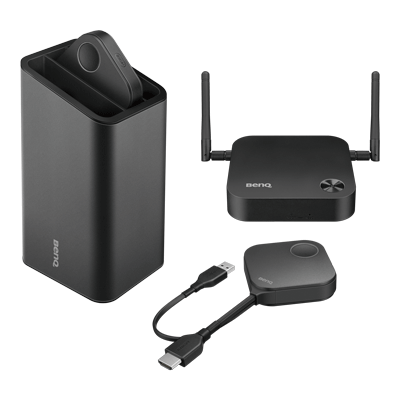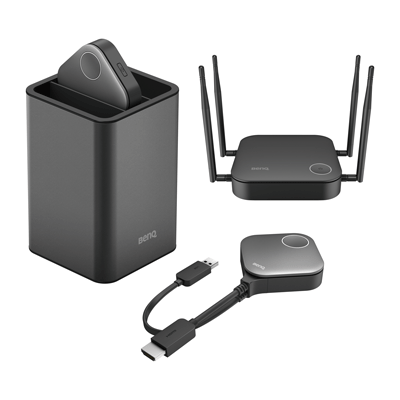Looking for a Mersive Solstice Pod Alternative?
- BenQ
- 2020-07-29
The Mersive Solstice is a popular wireless presentation system that is designed around leveraging a corporate network infrastructure to use a WiFi network to share a display. But with more than 40 other competitors on the market, which one is right for your huddle spaces and collaboration rooms?
The actual Mersive Solstice Pod is the receiver that attaches to a network and a display, while the proprietary Solstice app runs on the presenter's computer to enable them to connect to the Pod. The lower cost Gen2 models have 1080p resolution, while the Gen3 models are 4K resolution. Based on the market data from Futuresource, we will look at popular models sold worldwide that compare with the Mersive Solstice offerings at a similar price point and how they stack up on these three questions:
BenQ InstaShow & InstaShow S
According to Futuresource, BenQ InstaShow is the number #2 selling wireless presentation system in Europe under $1000, second only to Barco Clickshare. It uses a button that enables users to plug in a button and start presenting in seconds. Both BenQ InstaShow models come with two buttons and a tabletop button holder, with the InstaShow S having more advanced features and higher 4K resolution.
Barco Clickshare CS-100 & CS-200+
The Barco Clickshare platform uses a button system similar to BenQ InstaShow but typically requires the Clickshare App to be loaded on the presenter`s computer. The Clickshare CS-100 supports 1080p output and comes with one button, while the CS-200+ comes with two buttons and more advanced features with higher 4K resolution.
Is it easy to set up?
Mersive Solstice Pod
The Mersive Solstice Pod connects to both the network and display. To integrate the system into the corporate network, a 14 page Quick Start Guide outlines how to attach the Pod to the network, configure the user settings, and set up the system for secure collaboration.
Since the Solstice Pod’s live video streaming frame rate is dependent on the host network, there are minimum performance and baseline security standards to enable smooth video at 30 frames per second.
1.1MB of bandwidth times the number of simultaneously connected devices- Maximum packet latency of 35ms
- Maximum network jitter of 1 standard deviation
- Maximum packet loss of 0.2
When Solstice is deployed on an existing network, the Solstice hosts and user devices require a wired or wireless network connection with a minimum bandwidth of 20 Mbps. The details of configuring multiple ports on the network and modifying the firewalls to enable certain features are detailed in the Network Deployment Guide. The Solstice app may need to be deployed to employees to enable meetings to run faster.
BenQ InstaShow
Online and press reviewers are amazed at how easy the InstaShow is to set up and use. Unlike the Mersive Solstice Pod, the receiver does not require any corporate or other network access to operate. Connect an HDMI cable from the receiver to the display, then plug in a button to your notebook.
As indicated by My Tech Decisions, it took only a few minutes to connect and use InstaShow. Projector Central pointed out that InstaShow's combination of video quality with ease of set up and use is nothing short of amazing. The more advanced InstaShow S has the same setup experience – but has the ability to directly control Windows notebooks when using interactive displays.
Barco Clickshare
Like InstaShow, Clickshare platform is easy to set up as it enables IT managers to deploy the units without having to connect to the network. The receiver connects to power and HDMI port on display, and the CS-200+ has an additional USB touchback cable to enable direct control over Windows notebooks. The biggest setup difference is that the Clickshare receiver cannot be mounted on the ceiling. Given that the many meeting rooms that use projectors are ceiling mounted, this could create more expensive and difficult installations that require routing a cable through walls and ceiling to reach the projector. Besides, the company may need to deploy the app to its employees to enable the meetings to run faster.
Can visitors use them?
Mersive Solstice Pod
For an employee or visitor to access a Solstice Pod, they must log onto the same network that is hosting the Solstice Pod, and also have the Solstice app running on their system. For visitors to obtain the app, they will either need to download the app from the website or log in to the Solstice Pod on the network. Once connected to the unit, they will enter the IP address, which then enables them to install the Solstice app in their notebook.
This can present a challenge to certain visitors, since many organizations “lockdown” their notebooks from running external third-party software to protect from malware and may require IT support and approval for any application to be installed. Also, the Mersive Solstice does not support Chromebooks, so companies and schools that use Chromebooks may need to look for other alternatives.
BenQ InstaShow
InstaShow does not require any software applications or network connections for employees and visitors- they simply plug-in a button and start presenting in seconds. InstaShow is ideal for collaboration rooms, saving both time and money, especially for time-sensitive operations such as law firms. For IT staff, there is no deployment to manage, and visitors with "locked down" computers can connect without having to run extra software or download apps. Its industry-standard HDMI and USB-C connections plug into with notebooks, mobile phones, and tablets such as iPad Pro and Chromebook.
Barco ClickShare
ClickShare is relatively easy to use, as the employee or visitor plugs in the button to their computer, downloads the app, and after the software is installed or running, begin presenting. For a visitor with a "locked down" computer, they may not be able to download the ClickShare application onto their devices for security reasons - which may create delays. Also, ClickShare does not support Chromebook computers, so enterprises that standardize on Google apps may need to look at other solutions if their employees or visitors use Chromebooks.
What types of devices are supported?
Mersive Solstice Pod
Mersive Solstice Pod typically requires a proprietary application running on the computer to connect to the receiver; the system will only support Windows and Mac computers, as well as Android and iOS mobile devices. There is no Chromebook support, and while only the more expensive models have wired HDMI input ports – they do not support HDCP, which is required for most media players, TV boxes, and other HDMI devices that play copy-protected media. These sources would need a separate system to connect to the display in order to share any copy-protected content.
BenQ InstaShow
BenQ InstaShow uses a standard HDMI or USB-C buttons that can connect to Windows, Mac, and even Chromebooks. But because it doesn’t require any software – and supports HDCP, it can also connect to hundreds of types of HDMI 1.4 devices such as document cameras, digital media players, and even gaming consoles. For laboratory and engineering work, the InstaShow will connect to development boards such as a Raspberry Pi, and industrial equipment that outputs standard HDMI signals, such as a spectrum analyzer.
For mobile devices and tablets, the InstaShow can connect using an HDMI or USB-C button connection, while the InstaShow S can also support streaming from mobile devices via Airplay, Miracast, or the InstaShare app loaded on the iOS or Android phones and tablets.
Barco ClickShare
Typically, the Clickshare application must be running on the device to connect to the Clickshare receiver. The Clickshare platform offers applications for Windows, Mac OS computers, as well as iOS and Android mobile devices. There is no support for Chromebook devices or other Linux development boards, such as a Beagle Board. there is also currently no support for devices such as Blu-ray player or document cameras.
Conclusion - which one is right for you?
The subscription-free BenQ InstaShow has become one of the top-selling Mersive Solstice alternatives because it keeps the simple and intuitive button architecture like Barco Clickshare while eliminating the hussle of downloading applications and having to connect to network to present.
For huddle rooms and collaboration workspaces, the plug and play approach of the InstaShow keeps your meeting focused on the topic – without having to learn new apps or log in to a different network. The ability to connect to Chromebooks and other types of devices can also make a significant difference in effective communication using cameras, media players, and even development boards.


